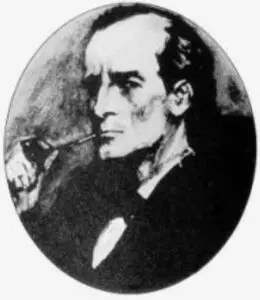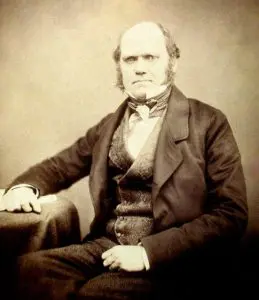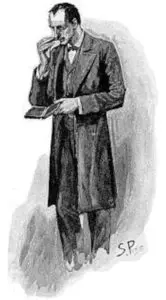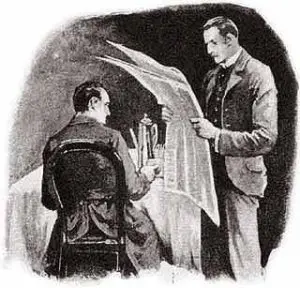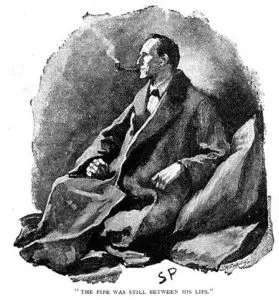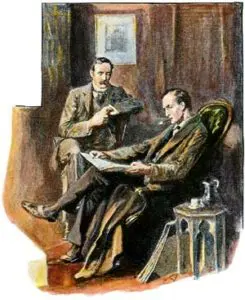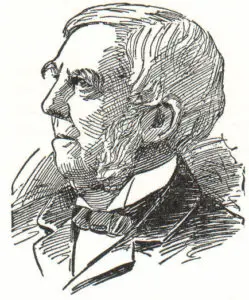Peter Bevelin is the author of the great book, Seeking Wisdom: From Darwin to Munger. I wrote about this book here: https://boolefund.com/seeking-wisdom/
Bevelin also wrote a shorter book, A Few Lessons from Sherlock Holmes. I’m a huge fan of Sherlock Holmes. Robert Hagstrom has written an excellent book on Holmes calledThe Detective and the Investor. Here’s my summary of Hagstrom’s book: https://boolefund.com/invest-like-sherlock-holmes/
I highly recommend Hagstrom’s book. But if you’re pressed for time, Bevelin’sA Few Lessons from Sherlock Holmes is worth reading.
Belevin’s book is a collection of quotations. Most of the quotes are from Holmes, but there are also quotes from others, including:
-
- Joseph Bell, a Scottish professor of clinical surgery who was Arthur Conan Doyle’s inspiration for Sherlock Holmes
- Dr. John Watson, Holmes’s assistant
- Dr. John Evelyn Thorndike, a fictional detective and forensic scientist in stories by R. Austin Freeman
- Claude Bernard, a French physiologist
- Charles Darwin, the English naturalist
- Thomas McRae, an American professor of medicine and colleague of Sir William Osler
- Michel de Montaigne, a French statesman and philosopher
- William Osler, a Canadian physician
- Oliver Wendell Holmes, Sr., an American physician and author
Sherlock Holmes:
Life is infinitely stranger than anything which the mind of man could invent.
(Illustration of Sherlock Holmes by Sidney Paget, via Wikimedia Commons)
Here’s an outline for this blog post:
-
- Some Lessons
- On Solving a Case–Observation and Inference
- Observation–Start with collecting facts and follow them where they lead
- Deduction–What inferences can we draw from our observations and facts?
- Test Our Theory–If it disagrees with the facts it is wrong
- Some Other Tools
SOME LESSONS
Bevelin quotes the science writer Martin Gardner on Sherlock Holmes:
Like the scientist trying to solve a mystery of nature, Holmes first gathered all the evidence he could that was relevant to his problem. At times, he performed experiments to obtain fresh data. He then surveyed the total evidence in the light of his vast knowledge of crime, and/or sciences relevant to crime, to arrive at the most probable hypothesis. Deductions were made from the hypothesis; then the theory was further tested against new evidence, revised if need be, until finally the truth emerged with a probability approaching certainty.
Bevelin quotes Holmes on the qualities needed to be a good detective:
He has the power of observation and that of deduction. He is only wanting in knowledge, and that may come in time.
It’s important to take a broad view. Holmes:
One’s ideas must be as broad as Nature if they are to interpret Nature.
However, focus only on what is useful. Bevelin quotes Dr. Joseph Bell:
He [Doyle] created a shrewd, quick-sighted, inquisitive man… with plenty of spare time, a retentive memory, and perhaps with the best gift of all–the power of unloading the mind of all burden of trying to remember unnecessary details.
Knowledge of human nature is obviously important. Holmes:
Human nature is a strange mixture, Watson. You see that even a villain and murderer can inspire such affection that his brother turns to suicide when he learns his neck is forfeited.
Holmes again:
Jealousy is a strange transformer of characters.
Bevelin writes that the most learned are not the wisest. Knowledge doesn’t automatically make us wise. Bevelin quotes Montaigne:
Judgment can do without knowledge but not knowledge without judgment.
Learning is lifelong. Holmes:
Like all other arts, the Science of Deduction and Analysis is one which can only be acquired by long and patient study, nor is life long enough to allow any mortal to attain the highest possible perfection in it.

ON SOLVING A CASE–Observation and Inference
Bevelin quotes Dr. John Evelyn Thorndyke, a fictional detective in stories by R. Austin Freeman:
…I make it a rule, in all cases, to proceed on the strictly classical lines on inductive inquiry–collect facts, make hypotheses, test them and seek for verification. And I always endeavour to keep a perfectly open mind.
Holmes:
We approached the case… with an absolutely blank mind, which is always an advantage. We had formed no theories. We were there simply to observe and to draw inferences from our observations.
Appearances can be deceiving. If someone is likeable, that can cloud one’s judgment. If someone is not likeable, that also can be misleading. Holmes:
It is of the first importance… not to allow your judgment to be biased by personal qualities… The emotional qualities are antagonistic to clear reasoning. I can assure you that the most winning woman I ever knew was hanged for poisoning three little children for their insurance-money, and the most repellant man of my acquaintence is a philanthropist who has spent nearly a quarter of a million on the London poor.
Holmes talking to Watson:
You remember that terrible murderer, Bert Stevens, who wanted us to get him off in ’87? Was there ever a more mild-mannered, Sunday-school young man?
OBSERVATION–Start with collecting facts and follow them where they lead
Bevelin quotes Thomas McCrae, an American professor of medicine and colleague of Sir William Osler:
More is missed by not looking than not knowing.
That said, to conduct an investigation one must have a working hypothesis. Bevelin quotes the French physiologist Claude Bernard:
A hypothesis is… the obligatory starting point of all experimental reasoning. Without it no investigation would be possible, and one would learn nothing: one could only pile up barren observations. To experiment without a preconceived idea is to wander aimlessly.
(Charles Darwin, Photo by Maull and Polyblank (1855), via Wikimedia Commons)
Bevelin also quotes Charles Darwin:
About thirty years ago there was much talk that geologists ought only to observe and not theorise; and I well remember someone saying that at this rate a man might as well go into a gravel-pit and count the pebbles and describe the colors. How odd it is that anyone should not see that all observation must be for or against some view if it is to be of any service!
Holmes:
Let us take that as a working hypothesis and see what it leads us to.
It’s crucial to make sure one has the facts clearly in mind. Bevelin quotes the French statesman and philosopher Montaigne:
I realize that if you ask people to account for “facts,” they usually spend more time finding reasons for them than finding out whether they are true…
Deception, writes Bevelin, has many faces. Montaigne again:
If falsehood, like truth, had only one face, we would be in better shape. For we would take as certain the opposite of what the liar said. But the reverse of truth has a hundred thousand shapes and a limitless field.
Consider why someone might be lying. Holmes:
Why are they lying, and what is the truth which they are trying so hard to conceal? Let us try, Watson, you and I, if we can get behind the lie and reconstruct the truth.
It’s often not clear–especially near the beginning of an investigation–what’s relevant and what’s not. Nonetheless, it’s vital to try to focus on what’s relevant because otherwise one can get bogged down by unnecessary detail. Holmes:
The principal difficulty in your case… lay in the fact of their being too much evidence. What was vital was overlaid and hidden by what was irrelevant. Of all the facts which were presented to us we had to pick just those which we deemed to be essential, and then piece them together in order, so as to reconstruct this very remarkable chain of events.
Holmes again:
It is of the highest importance in the art of detection to be able to recognize out of a number of facts which are incidental and which are vital. Otherwise your energy and attention must be dissipated instead of being concentrated.
Bevelin quotes the Canadian physician William Osler:
The value of experience is not in seeing much, but in seeing wisely.
Observation is a skill one must develop. Most of us are not observant. Holmes:
The world is full of obvious things which nobody by any chance ever observes.
(Illustration of Sherlock Holmes by Sidney Paget (1891), via Wikimedia Commons)
Holmes again:
I see no more than you, but I have trained myself to notice what I see.
Small things can have the greatest importance. Several quotes from Holmes:
-
- The smallest point may be the most essential.
- It has long been an axiom of mine that the little things are infinitely the most important.
- What seems strange to you is only so because you do not follow my train of thought or observe the small facts upon which large inferences may depend.
- It is just these very simple things which are extremely liable to be overlooked.
- Never trust general impressions, my boy, but concentrate yourself upon details.
Belevin also quotes Dr. Joseph Bell:
I always impressed over and over again upon all my scholars–Conan Doyle among them–the vast importance of little distinctions, the endless significance of trifles.
Belevin points out that it’s easy to overlook relevant facts. It’s important always to ask if one has overlooked something.
DEDUCTION–What inferences can we draw from our observations and facts?
Most people reason forward, predicting what will happen next. But few people reason backward, inferring the causes of the effects one has observed. Holmes:
Most people, if you describe a chain of events to them, will tell you what the result would be. They can put those events together in their minds, and argue from them that something will come to pass. There are few people, however, who, if you told them a result, would be able to evolve from their own inner consciousness what the steps were which led up to that result. This power is what I mean when I talk of reasoning backward, or analytically.
Often the solution is simple. Holmes:
The case has been an interesting one… because it serves to show very clearly how simple the explanation may be of an affair which at first sight seems to be almost inexplicable.
History frequently repeats. Holmes:
They lay all the evidence before me, and I am generally able, by the help of my knowledge of the history of crime, to set them straight. There is a strong family resemblance about misdeeds, and if you have all the details of a thousand at your finger ends, it is odd if you can’t unravel the thousand and first.
Holmes:
There is nothing new under the sun. It has all been done before.
That said, some cases are unique and different to an extent. But bizarre cases tend to be easier to solve. Holmes:
As a rule… the more bizarre a thing is the less mysterious it proves to be. It is your commonplace, featureless crimes which are really puzzling, just as a commonplace face is the most difficult to identify.
(Illustration of Sherlock Holmes by Sidney Paget, via Wikimedia Commons)
Holmes again:
It is a mistake to confound strangeness with mystery. The most commonplace crime is often the most mysterious, because it presents no new or special features from which deductions may be drawn.
If something we expect to see doesn’t happen, that in itself can be a clue. There was one case of a race horse stolen during the night. When Holmes gathered evidence, he learned that the dog didn’t bark. This means the midnight visitor must have been someone the dog knew well.
Moreover, many seemingly isolated facts could provide a solution if they are taken together. Holmes:
You see all these isolated facts, together with many minor ones, all pointed in the same direction.
After enough facts have been gathered, then one can consider each possible hypothesis one at a time. In practice, there are many iterations: new facts are discovered along the way, and new hypotheses are constructed. By carefully excluding each hypothesis that is not possible, eventually one can deduce the hypothesis that is true. Holmes:
That process… starts upon the supposition that when you have eliminated all which is impossible, then whatever remains, however improbable, must be the truth. It may well be that several explanations remain, in which case one tries test after test until one or other of them has a convincing amount of support.
TEST OUR THEORY–If it disagrees with the facts it is wrong
What seems obvious can be very misleading. Holmes:
There is nothing more deceptive than an obvious fact.
“Truth is stranger than fiction,” said Mark Twain. Holmes:
Life is infinitely stranger than anything which the mind of many could invent.
Holmes again:
One should always look for a possible alternative and provide against it. It is the first rule of criminal investigation.
(Illustration of Sherlock Holmes by Sidney Paget, via Wikimedia Commons)
It’s vital to take time to think things through. Watson:
Sherlock Holmes was a man… who, when he had an unsolved problem upon his mind, would go for days, and even for a week, without rest, turning it over, rearranging his facts, looking at it from every point of view until he had either fathomed it or convinced himself that his data were insufficient.
Sometimes doing nothing–or something else–is best when one is waiting for more evidence. Holmes:
I gave my mind a thorough rest by plunging into a chemical analysis. One of our greatest statesmen has said that a change of work is the best rest. So it is.
SOME OTHER TOOLS
Bevelin observes the importance of putting oneself in another’s shoes. Holmes:
You’ll get results, Inspector, by always putting yourself in the other fellow’s place, and thinking what you would do yourself. It takes some imagination, but it pays.
Others may be of help. Holmes:
If you will find the facts, perhaps others may find the explanation.
Watson was a great help to Holmes. Watson:
I was a whetstone for his mind. I stimulated him. He liked to think aloud in my presence. His remarks could hardly be said to be made to me–many of them would have been as appropriately addressed to his bedstead–but nonetheless, having formed the habit, it had become in some way helpful that I should register and interject. If I irritated him by a certain methodical slowness in my mentality, that irritation served only to make his own flame-like intuitions and impressions flash up the more vividly and swiftly. Such was my humble role in our alliance.
(Illustration of Sherlock Holmes and John Watson by Sidney Paget, via Wikimedia Commons)
Different lines of thought can approximate the truth. Bevelin quotes Dr. Joseph Bell:
There were two of us in the hunt, and when two men set out to find a golf ball in the rough, they expect to come across it where the straight lines marked in their minds’ eye to it, from their original positions, crossed. In the same way, when two men set out to investigate a crime mystery, it is where their researches intersect that we have a result.
Holmes makes the same point:
Now we will take another line of reasoning. When you follow two separate chains of thought, Watson, you will find some point of intersection which should approximate to the truth.
It’s essential to be open to contradictory evidence. Bevelin quotes Charles Darwin:
I have steadily endeavoured to keep my mind free so as to give up any hypothesis, however much beloved… as soon as facts are shown to be opposed to it.
Mistakes are inevitable. Holmes:
Because I made a blunder, my dear Watson–which is, I am afraid, a more common occurrence than anyone would think who only knew me through your memoirs.
Holmes remarks that every mortal makes mistakes. But the best are able to recognize their mistakes and take corrective action:
Should you care to add the case to your annals, my dear Watson… it can only be as an example of that temporary eclipse to which even the best-balanced mind may be exposed. Such slips are common to all mortals, and the greatest is he who can recognize and repair them.
Bevelin quotes the physician Oliver Wendell Holmes, Sr.:
The best part of our knowledge is that which teaches us where knowledge leaves off and ignorance begins.
(Oliver Wendell Holmes, Sr., via Wikimedia Commons)
In the investment world, the great investors Warren Buffett and Charlie Munger use the term circle of competence. Here’s Buffett:
What an investor needs is the ability to correctly evaluate selected businesses. Note that word “selected”: You don’t have to be an expert on every company, or even many. You only have to be able to evaluate companies within your circle of competence. The size of that circle is not very important; knowing its boundaries, however, is vital.
Buffett again:
What counts for most people in investing is not how much they know, but rather how realistically they define what they don’t know.
Munger:
Knowing what you don’t know is more useful than being brilliant.
Finally, here’s Tom Watson, Sr., the founder of IBM:
I’m no genius. I’m smart in spots–but I stay around those spots.
BOOLE MICROCAP FUND
An equal weighted group of micro caps generally far outperforms an equal weighted (or cap-weighted) group of larger stocks over time. See the historical chart here: https://boolefund.com/best-performers-microcap-stocks/
This outperformance increases significantly by focusing on cheap micro caps. Performance can be further boosted by isolating cheap microcap companies that show improving fundamentals. We rank microcap stocks based on these and similar criteria.
There are roughly 10-20 positions in the portfolio. The size of each position is determined by its rank. Typically the largest position is 15-20% (at cost), while the average position is 8-10% (at cost). Positions are held for 3 to 5 years unless a stock approachesintrinsic value sooner or an error has been discovered.
The mission of the Boole Fund is to outperform the S&P 500 Index by at least 5% per year (net of fees) over 5-year periods. We also aim to outpace the Russell Microcap Index by at least 2% per year (net). The Boole Fund has low fees.
If you are interested in finding out more, please e-mail me or leave a comment.
My e-mail: jb@boolefund.com
Disclosures: Past performance is not a guarantee or a reliable indicator of future results. All investments contain risk and may lose value. This material is distributed for informational purposes only. Forecasts, estimates, and certain information contained herein should not be considered as investment advice or a recommendation of any particular security, strategy or investment product. Information contained herein has been obtained from sources believed to be reliable, but not guaranteed. No part of this article may be reproduced in any form, or referred to in any other publication, without express written permission of Boole Capital, LLC.


